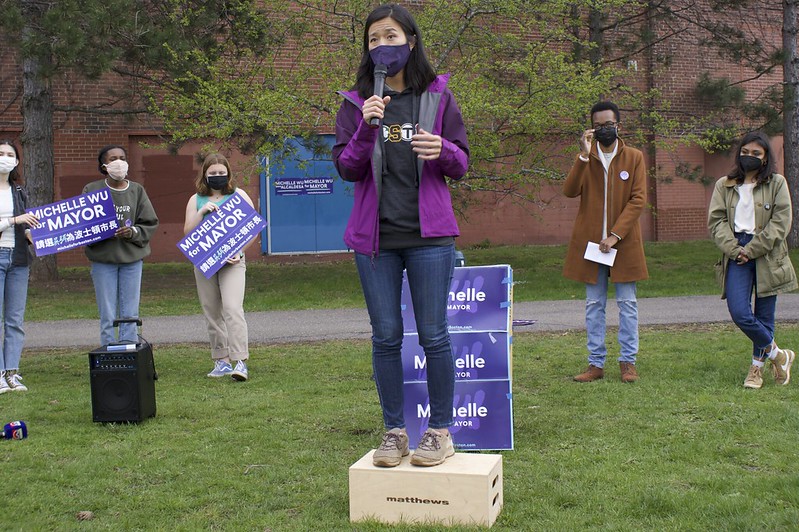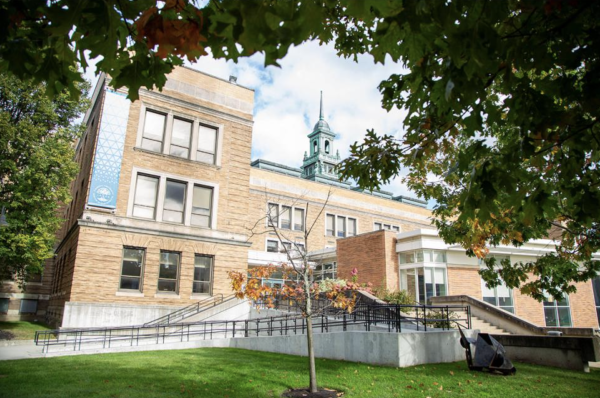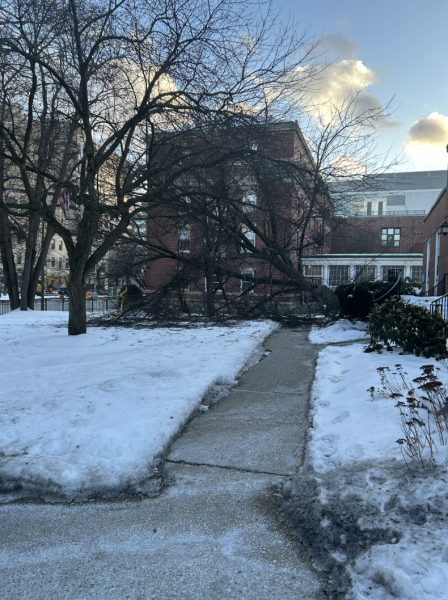How the Boston mayoral race is impacting Simmons students
Boston mayoral candidate Michelle Wu speaking to young supporters. Image courtesy of the Wu campaign.
October 27, 2021
Simmons students express that they are directly impacted by conversations of transportation and housing affordability as Annissa Essaibi George and Michelle Wu battle for the Boston mayoral seat.
Sophomore Natalie Ochoa, a commuter student, expressed concern over the amount of money the T shaves off of her income. Like many other Boston residents, she would like to see the T free of charge. Safety concerns due to recent incidents with the T, unreliability, and the expense of a ticket or pass has left both city residents and commuters into Boston in trouble.
Wu has championed fare-free public transportation far before she announced a run for mayor, but the issue is controversial as George has even gone as far as to publicly criticize Wu for this policy. A poll conducted by Data for Progress, a progressive think tank, demonstrated that 75% of likely college-going voters were supportive of fare-free public transportation.
Former candidate for Brookline’s Town Meeting and Simmons senior Chloe Janes is a self-proclaimed “huge fan of the MBTA.” Having grown up in Brookline, Janes has been using the T since she was in elementary school. She believes that the T is a public good that should be available free of charge.
In a report from Boston’s Department of Neighborhood Development on student housing trends in the 2018 to 2019 school year, a total of 150,415 students are enrolled in Boston-based colleges and universities. Of Simmons University’s undergraduate students, 33.5% live in off campus housing.
Boston has historically been one of the most expensive housing markets in America. Rent control and affordable housing have exceedingly been a conversation in Boston as a result of the lasting effects COVID has had on lower income communities and their ability to afford housing. Left with very few choices, college students fall trap to inflated rent prices.
On the issue of housing affordability, both Wu and George believe that there is a need for more affordable housing units. However, Wu has been an outspoken advocate for rent control which is banned under Massachusetts law and would need to be implemented by the state legislature. George maintains that rent stabilization is a short-term solution and has been against a state-wide eviction moratorium as well.
“If housing was more affordable, it would give us a chance to save more. A lot of my income goes to my rent. I’m working just for my rent, really. I could be saving that for things I want to do over the summer or books,” Ochoa said.
Senior Layla Khan who lives in Mission Hill because of its affordability, shares Ochoa’s sentiments. She feels that the expensive housing market is a hindrance on student success.
“So many of us work jobs or work-study jobs which take away from being able to study and learn and do internships and research,” Khan said.
Youth voters are increasingly crucial in elections across America, but the mayoral election has yet to determine how important the demographic will be. Janes suspects that while students are an important demographic, they will not be the deciding factor, adding that many students are not registered to vote in Boston or pay attention to city politics.
“While it is important for students to vote, the needs of students are very different than the needs of residents. Oftentimes, there are a lot of decisions made that have really long term impacts on residents, taxes for example, that students don’t feel,” Janes explained. “If there were a candidate that is trying to appeal to mainly college students, that would be a red flag for me. And that’s coming from a college student.”
Students registered in Boston can vote through the week during the early voting period until Friday, October 29 at 5 p.m. More early voting information can be found on the city’s website. Voters can also cast their ballots on Election Day, November 2 and can find their polling locations here.








